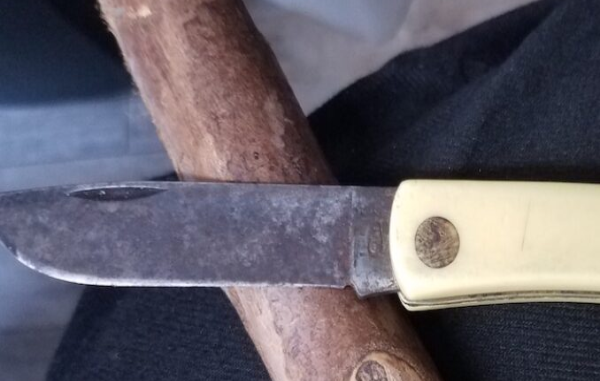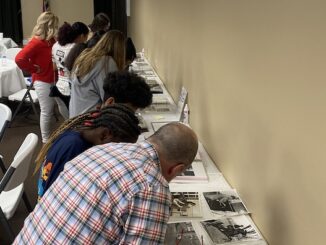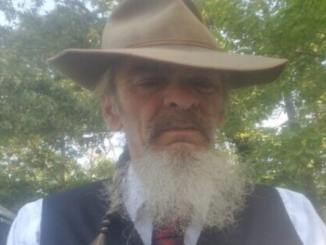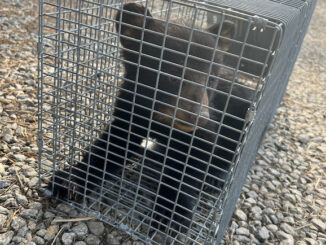
I knew and dreaded that flapping sound, and immediately began looking for a safe place to change a flat tire.
It was hot, almost nastily so, and I gave up all hope of remaining respectable for the day’s destination. The spare changed with suspicious ease, and barely made it to a nearby station where a couple dollars of coffee change pumped it full of what I hoped sufficient air to find a tire store. My buddy was standing by when I limped in on steel belts, slick rubber and strong prayers. After a few minutes of evaluation, he set to work.
I made myself comfortable on a rough bench, content to enjoy the breeze and wave at the Saturday traffic through downtown Hallsboro. The bench was left over from pieces of a tree or two cleared a few weeks before, just a bark-on slab set on two rounds of more or less equal height. I’ve sat on worse under worse circumstances.

Idly I picked up a scrap of wood, and without even thinking about it, pulled my battered Sodbuster from a pocket and began reducing the scrap to smaller scraps.
There is peace in whittling; even if there is no desire to produce anything, it keeps the hands busy (and these days, whittling keeps the cellphone out of reach). I had forgotten how relaxing the simple act of shaving a chunk of wood can be under the right circumstances.
I grew up with a pocketknife on me at all times, from about the age of seven. It was a huge milestone for me, when the Old Man took me to an old fashioned hardware store and helped me pick one that he felt was appropriate. It was similar to his, and it was a pocketknife – to me, those were the things that mattered. That first knife, which I still have, was a sheep’s foot Barlow with an edge that required care to sharpen, and had no point, thus eliminating the temptation to jab things that shouldn’t be jabbed, like other little boys.
A few years later I graduated to a Kamp King, of which I was inordinately proud. It had a large blade (with a point), a small blade that was razor sharp, a can opener, and a bottle opener. The can opener could be safely drafted for tasks ranging from adding a hole to a dog collar to removing a stuck .22 casing. There were many others along the way, but my love of pocketknives in general is a column for another day.
Almost all of them, at some point, reduced a stick or twenty to splinters, whether to start fires, create a piece of questionable art, or just to kill time. I would never put on airs by referring to any of my whittling as carving, since I have friends who can and do produce true art with a pocketknife. I just whittled, and sometimes you could tell I was making something.
There is something soothing about the stroke of the blade, the feel as a good edge bites into the wood, the satisfaction of working around a flaw in the particular piece of pine or poplar or dogwood or maple or oak, the clean cut of the chip or strip falling away, then repeating the entire process. I think it helps the thought process, or else just makes thinkin’ too much something that can be put off for a little while.
There’s a famous spot in Southport known as the Whittler’s Bench; a dear friend starts her historic tours there every night. Robert Ruark wrote about it; Claude Howell drew and painted the bench and its regulars when the menhaden boats still docked there, and pilots waited for a flag or a “wireless signal” to guide oceangoing ships on the river. It was a place where one found wisdom among the shavings underfoot, or what passed for wisdom, when Ruark was a boy. Now it’s more of a convenient place for tourists to rest. Long after its halcyon days as a 20th century repository of philosophy and higher learning, but before the crush of tourists, I sat there a few times to have lunch. And yes, I whittled, although I had no need to dispense knowledge, and little enough to share.
There was a similar place in a town I once called home, a half-rotten but unnamed bench that wrapped around a woebegone ancient oak beside a former mule barn turned flea market. It never drew the attention of its coastal cousin along the river, but I spent some time there on a warm winter’s day, reading a book purchased from the secondhand seller a few yards away. The heavy old cypress seat was crisscrossed with initials and dates from several decades, and of course I added my own. Sadly that tree and the bench were lost in a hurricane, and the spot itself is now covered in concrete.
A contemporary of my father told me about how his father had made a deal sitting on that bench just days before the crash of 1929, and that deal helped his family survive and even thrive during the Great Depression. It made me wonder how many other deals had been made there, whether between farmers or mule sellers or both.
I also had to wonder how many of those deals involved a man idly slicing shavings off a handy piece of the oak’s castoff limbs.
Whittling teaches the basics of knife safety: cutting away from one’s self, being patient, keeping a blade sharp and so on. When the muscle memory becomes skill, one can focus on bigger things while still turning a simple stick into a sharper stick, a fancy stick with the flats that wrap around it like vines, or just a smaller stick. It teaches knife handling, true, but it teaches more. It teaches patience, which is sorely lacking in today’s society of instant gratification.
The old master sculptors decided what didn’t look like a statue when they began carving on a piece of stone, and started chipping those parts off; one of them, I disremember which, said he was searching for the soul within the marble.
I never found the soul of my stick the other day as I waited for Reynaldo to get my truck rolling again. I did have the quiet satisfaction of reducing a stick to a pile of long shavings with the occasional toothpick-sized splinter. That was about enough art for one man to handle for one day.
It’s sad that so many people, especially kids, can’t or don’t carry a pocketknife any more. I really think a lot more problems could be solved if people had to sit down and think a spell, and began cutting on a piece of wood to keep their fingers busy while finding a solution.
Sometimes it’s a good thing to just sit still for a while, open a pocketknife, and search for the soul in a handy stick. Who knows but you might find a forgotten part of your own along the way.
















